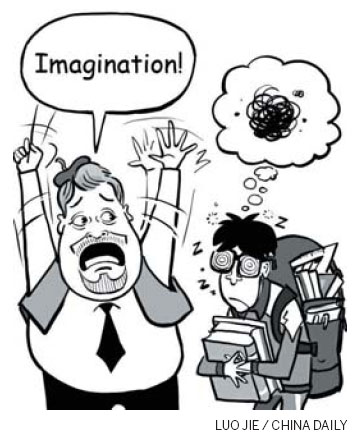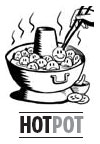View
When creativity is the art of making excuses
Updated: 2011-01-25 07:52
By Stuart Beaton (China Daily)

I have been told many times that Chinese students lack imagination, but looking back over the last few semesters, this might not be the case.
In fact, I'd say that some of my students have displayed a great deal of imagination, and have excelled at the art of invention along the way.
Unfortunately, they're not applying themselves in the academic field when doing so.
Rather, they are becoming masters of making excuses.

Late last year, I set my students some seemingly simple tasks and made sure they had ample time to do them. Most of them involved group work, and I left it up to the students to organize how many should be in each group - the instruction being: "Well, you'll need about 10 students per group."
Time passed, and the day for their presentations came. I sat back and watched the first three presentations - which went smoothly. When it came to the fourth, however, things came unstuck.
"We haven't done ours," came a plaintive cry, "because we had 11 students."
As I fought to lower my blood pressure and eyebrows, I asked another student, "Do you know what 'about' means?"
It transpired they did, but 11 is more than 10.
Since then, I have been a bit more specific when it comes to laying down the rules for assignments. I am careful to spell out the due dates, the lengths and numbers involved in any activity and to gently adjust them so that there can be no confusion about what it is I am trying to get them to do.
Of course, this doesn't mean I get it, but it is a step in the right direction.
Part of my course involves the students making a short film, on any subject, in any genre, provided that it is in English. The students were told that they needed to develop something that was their own original work.
Come the day of the screening of the film, I was a little surprised to hear the opening music to the TV series Lie To Me, coming from the speakers.
I was even more surprised by the shot-for-shot remake of a complete episode, intercut with scenes from the original.
After the lights went back up, I shuffled up to the front of the class, learnt against the lectern and quietly asked the film's director: "How is that your own, original work?"
"Well," came the reply, "we acted it out and filmed it."
Following that, my syllabus now has been appended to include the magical words, "not based on anything else. Even Chinese TV shows or movies. It must be YOUR work!"
You cannot teach someone to be imaginative. It is something that develops along the way. You can, however, give children a chance to flex their imaginations. I've always looked upon imagination as a muscle, which has to be given exercise to grow and gain strength - if you don't let it work out, it will atrophy.
As I watch Chinese schoolchildren hike along the streets, backpacks filled with books, often dragging a musical instrument, I wonder when they have the opportunity to use their imaginations. All those after-school classes and extracurricular activities take a huge slice out of the precious little time that they have to be children. Couple that with what seems to be an emphasis on rote learning, and there's very little space for imagination to grow, let alone flourish.
I'm looking forward to seeing how imaginative my next batch of students will be.
China Daily
E-paper

Ear We Go
China and the world set to embrace the merciful, peaceful year of rabbit
Carrefour finds the going tough in China
Maid to Order
Striking the right balance
Specials

Mysteries written in blood
Historical records and Caucasian features of locals suggest link with Roman Empire.

Winning Charm
Coastal Yantai banks on little things that matter to grow

New rules to hit property market
The State Council launched a new round of measures to rein in property prices.
